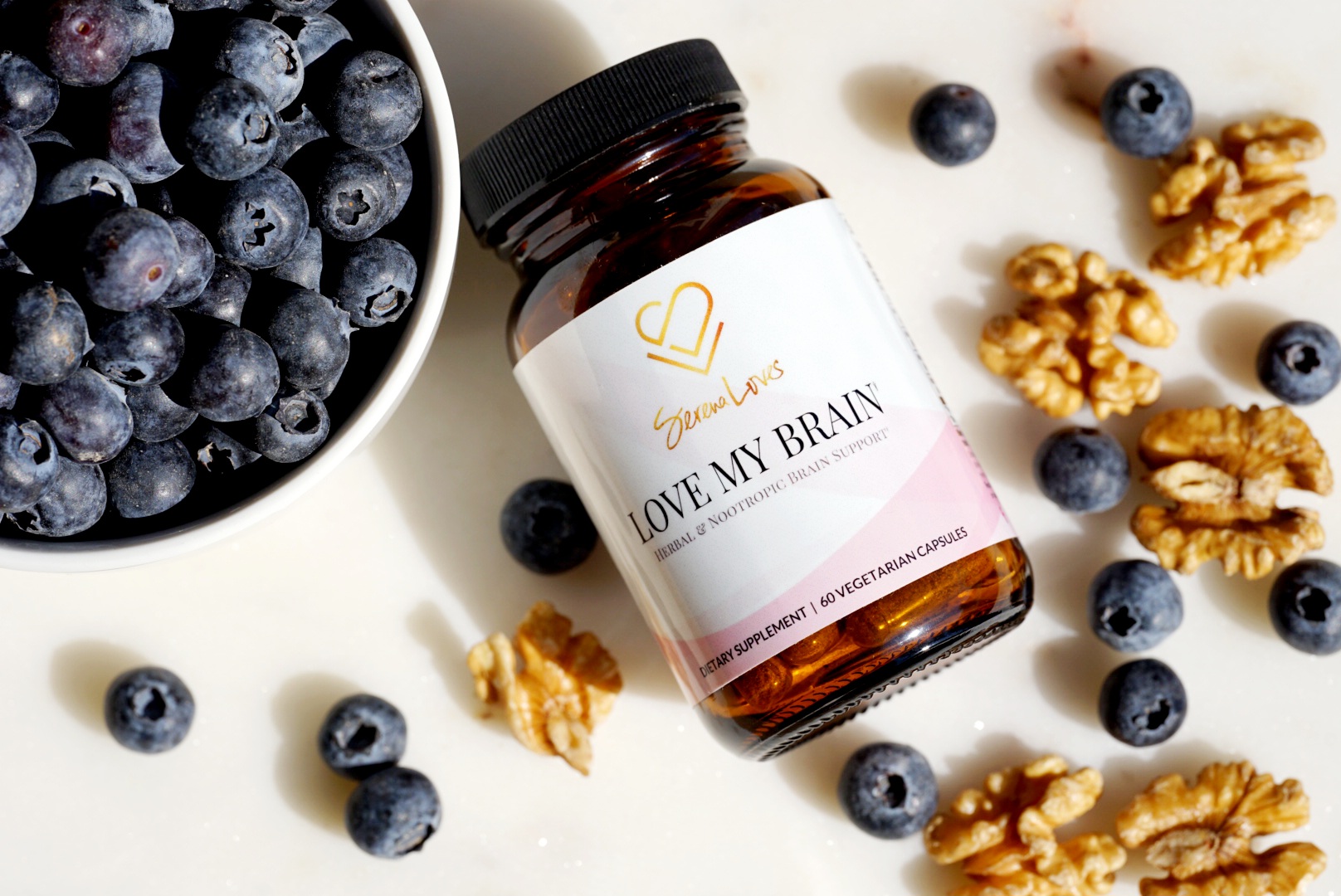Key Takeaways
- Daily habits—stress management, quality sleep, whole-food nutrition, hydration, and movement—can slow neuroinflammation, support cognitive resilience, and reduce risk of neurodegenerative disease.
- Midlife hormonal shifts (especially declining estrogen/progesterone during perimenopause and menopause) increase brain fog, mood shifts, and inflammation, but plant-based nutrition and lifestyle support can counteract these changes.
- Key foods like leafy greens, berries, probiotics, turmeric, omega-3s, nuts, and cruciferous veggies nourish brain health and cellular repair, building long-term cognitive strength.
Imagine waking up without brain fog. Feeling calm– less anxious– and emotionally grounded, after a solid seven hours of sleep. Whether or not you are experiencing these often felt symptoms of perimenopause and menopause, this is the time to take steps to protect your brain health—because what you eat and how you live today will affect how it functions in the years to come.
Everything from managing stress, to eating a healthy diet, to getting good sleep can help delay cognitive decline and neurodegenerative disease, which are related to neuroinflammation. By creating a few healthy habits, though, you’ll likely see changes right away.
What is Neuroinflammation?
Neuroinflammation is inflammation in the brain triggered by immune cells in your central nervous system. Just like general inflammation in the body, it’s not inherently bad. It can play a protective role in healing, in fending off viruses, and support learning and memory. Chronic neuroinflammation, on the other hand, whether from stress, toxin exposure or poor diet, is just bad for your health (1).
Signs of chronic neuroinflammation include poor short-term memory and brain fog, anxiety, depression, mood swings, fatigue, poor sleep, headaches, neck stiffness, and nausea. It’s also been linked to neurodegenerative diseases, mood disorders, autoimmune issues, metabolic disorders and obesity.

The Peri- and Menopausal Brain Shift
Besides neuroinflammation, your brain health can also be impacted by peri- and menopause. Perimenopause is the phase preceding menopause, when your hormones begin to “sputter.” Your menstruation may become erratic and you may develop a host of symptoms brought about by hormonal fluctuations. Once you have not had a period for 12 months, then you are technically in menopause.
During these phases, your body undergoes a dramatic hormonal shift. Estrogen levels can drop by up to 90%, and progesterone can decline even more steeply.
You may experience decreased neurogenesis and synaptic plasticity (2). Estrogen supports the formation of new brain cells and strengthens synaptic connections—especially in the hippocampus and prefrontal cortex, which regulate memory and executive function. As estrogen declines, these brain regions may shrink and you may experience cognitive dysfunction.
A 2014 review in Physiological Reviews highlights how estrogen drives brain-derived neurotrophic factor (BDNF), which supports memory and learning.
Some are also at greater risk for depression and anxiety. Estrogen modulates serotonin, dopamine, and norepinephrine—all neurotransmitters that regulate mood and motivation. Progesterone influences the calming neurotransmitter GABA. As both hormones decrease, women in midlife face a significantly higher risk for mood instability (3).
The brain fog and forgetfulness many women experience in midlife aren’t imagined—they’re connected to hormonal changes affecting neurotransmission and synaptic efficiency. Functional MRI studies have shown changes in brain activation patterns during cognitive tasks in menopausal women, suggesting both structural and metabolic brain changes (4).
Heightened neuroinflammation is an additional factor. Estrogen has potent anti-inflammatory properties in the brain. When estrogen declines, proinflammatory molecules like IL-6 and TNF-alpha increase, triggering oxidative stress and overactive immune response, or microglial overactivation (5). And this leads to the decline in brain health I’ve described above.
Progesterone is known for its sedative properties, in part due to its impact on GABA receptors. When it falls during menopause, sleep becomes fragmented, and the ability to cope with daily stress declines. Poor sleep, in turn, exacerbates inflammation and mood issues, creating a vicious cycle (6).
While these changes are biologically normal, the ways we respond to these aspects of peri- and menopause can deeply affect our long-term brain health and quality of life.
The Double Whammy of COVID-19
Proactive support for brain health is more important than ever. For women already navigating hormonal fluctuations, a COVID infection may amplify neuroinflammation and worsen cognitive symptoms.
Recent research shows that women are 1.5 to 2 times more likely than men to experience long COVID, and the symptoms often mirror those of perimenopause and menopause: brain fog, fatigue, poor memory, anxiety, and disrupted sleep (7).
This isn’t coincidental. Estrogen appears to have a protective role in immune modulation and inflammation control.
Early data suggests that women with lower estrogen levels have more severe COVID outcomes, potentially due to increased inflammatory responses (8).

So do your brain a favor…
At any time, but especially if you are experiencing perimenopause or menopause, show your brain some extra love by avoiding these five things:
Alcohol, which is metabolized in the brain and impairs memory and mood regulation, and increases brain inflammation.
Sugar promotes insulin resistance and affects healthy neuron function, and may contribute to Alzheimer’s.
Processed foods disrupt gut health and increase oxidative stress, which damages brain cells.
Fried foods rich in inflammatory omega-6 fats and advanced glycation end products (AGEs), compromise blood flow to the brain.
Tuna and swordfish can likely contain mercury, a neurotoxin so opt instead for plant-based omega-3s or smaller, fresh-water fish.
10 Ways to Nourish Your Brain
In my Culinary Alchemy® approach, we use functional, plant-based nutrition to promote optimal cognitive performance, emotional balance, and neuroprotection. Build your brain-boosting plate with these delicious foods:
- Blueberries – rich in anthocyanins and flavonoids that reduce oxidative stress and improve memory. Clinical trials show they improve executive function and delay cognitive aging.
- Leafy greens (spinach, kale, Swiss chard) – high in folate, lutein, and vitamin K. A long-term study published in Neurology showed women who ate one serving of greens daily had brains 11 years younger than those who did not (9).
- Probiotic and prebiotic foods, including fermented foods like sauerkraut, kimchi, and coconut yogurt, and fiber-rich foods like garlic, leeks, and onions. A healthy gut microbiome supports the gut-brain axis and helps regulate estrogen metabolism.
- Turmeric (curcumin) is a natural anti-inflammatory that boosts BDNF and reduces symptoms of depression and fatigue. Curcumin crosses the blood-brain barrier and has been shown to enhance working memory. Try this delicious hummus for a quick hit.
- Omega-3s (chia seeds, flaxseeds, walnuts, algae oil) which contain EPA and DHA, are key in maintaining neuron integrity. Plant-based sources, especially combined with B12 and choline, support focus and memory.
- Nuts and seeds like almonds, walnuts, pumpkin seeds, are rich in vitamin E, zinc, and essential fats and all of which protect the brain from oxidative damage.
- Dark chocolate (70% cacao or higher) contains flavonoids, which improve blood flow to the brain, support memory, and elevate mood by boosting serotonin and dopamine.
- Cruciferous vegetables (broccoli, Brussels sprouts, cauliflower) contain sulforaphane, which supports detoxification, lowers inflammation, and may reduce amyloid plaque formation that has been linked to Alzheimer’s (10).
- Berries (raspberries, blackberries, strawberries) are high in polyphenols that improve communication between neurons and reduce risk of neurodegenerative disease.
- Hydration is key to brain health. Even mild dehydration impairs focus, memory, and mood. Aim for at least half your body weight in ounces per day, more if you’re active or in a dry climate.
Building Resilience
Menopause and long COVID both create unique challenges for the female brain, but they also highlight a powerful truth: your brain is responsive. It adapts to nourishment, rest, emotional support, and smart lifestyle choices. You can reduce brain fog, support your immune system, and reclaim your clarity and calm—starting now.
Supplements like my B12 Strong can provide foundational support, especially if you eat a plant-based diet. Remember: brain health is cumulative. Every step you take today builds resilience for tomorrow.
xo – Serena
Frequently Asked Questions:
1. What is “brain fog,” and why does it occur during menopause?
“Brain fog” refers to feelings of mental confusion, forgetfulness, and lack of focus or mental clarity. During menopause, the decline in estrogen levels affects neurotransmitters and neural pathways involved in cognition, leading to these symptoms.
2. Is hormone replacement therapy (HRT) beneficial for cognitive symptoms during menopause?
Hormone replacement therapy (HRT) can be effective in alleviating some menopausal symptoms, including cognitive difficulties. However, the decision to use HRT should be individualized, considering the potential benefits and risks. It’s essential to consult with a healthcare provider to determine if HRT is appropriate for your specific situation.
3. How can I differentiate between cognitive changes due to menopause and those due to long COVID?
Both menopause and long COVID can present with similar cognitive symptoms, such as brain fog and memory issues. To differentiate between the two, consider the timing of symptom onset:
- Menopause-related cognitive changes: Typically coincide with other menopausal symptoms like hot flashes, mood swings, and irregular periods.
- Long COVID-related cognitive changes: Occur following a COVID-19 infection and may persist for weeks or months after recovery.
If you’re experiencing cognitive symptoms and are uncertain about their cause, consult with a healthcare professional.
4. Can lifestyle changes mitigate cognitive symptoms during menopause?
Yes, adopting healthy lifestyle habits can help alleviate cognitive symptoms associated with menopause. Consider the following strategies:
- Regular Physical Activity: Engaging in exercises like walking, yoga, or strength training can enhance blood flow to the brain and support cognitive function.
- Balanced Diet: Following a diet rich in fruits, vegetables, whole grains, and plant-based or organic, lean proteins provides essential nutrients that support brain health.
- Adequate Sleep: Prioritizing quality sleep helps the brain rest and repair, improving memory and concentration.
- Stress Management: Practicing mindfulness, meditation, or deep-breathing exercises can reduce stress, which may exacerbate cognitive symptoms.
5. Are there specific nutrients that support brain health during menopause?
Certain nutrients have been identified to support brain health, including:
- Omega-3 Fatty Acids: Found in fatty fish, flaxseeds, and walnuts, omega-3s are essential for brain function and may help reduce cognitive decline.
- Antioxidants: Vitamins C and E, found in berries, citrus fruits, and nuts, help combat oxidative stress that can damage brain cells.
- B Vitamins: Present in whole grains, eggs, and leafy greens, B vitamins support energy production and cognitive function.
6. Can cognitive training exercises help with menopause-related brain fog?
Engaging in cognitive training exercises, such as puzzles, memory games, and learning new skills, can enhance neuroplasticity and may help alleviate symptoms of brain fog experienced during menopause.
7. Are there medical treatments available for cognitive symptoms during menopause?
In addition to hormone replacement therapy (HRT), other medical treatments may be considered to address cognitive symptoms during menopause. It’s important to consult with a healthcare provider to discuss the potential benefits and risks of various treatment options.
Citations:
- Ransohoff RM, Schafer D, Vincent A, Blachère NE, Bar-Or A. Neuroinflammation: Ways in Which the Immune System Affects the Brain. Neurotherapeutics. 2015 Oct;12(4):896-909. doi: 10.1007/s13311-015-0385-3. PMID: 26306439; PMCID: PMC4604183.
- Motlani V, Motlani G, Pamnani S, Sahu A, Acharya N. Endocrine Changes in Postmenopausal Women: A Comprehensive View. Cureus. 2023 Dec 29;15(12):e51287. doi: 10.7759/cureus.51287. PMID: 38288203; PMCID: PMC10823308.
- Bendis PC, Zimmerman S, Onisiforou A, Zanos P, Georgiou P. The impact of estradiol on serotonin, glutamate, and dopamine systems. Front Neurosci. 2024 Mar 22;18:1348551. doi: 10.3389/fnins.2024.1348551. PMID: 38586193; PMCID: PMC10998471.
- Yu Q, Herold F, Becker B, Klugah-Brown B, Zhang Y, Perrey S, Veronese N, Müller NG, Kramer AF, Zou L. Cognitive benefits of exercise interventions: an fMRI activation likelihood estimation meta-analysis. Brain Struct Funct. 2021 Apr;226(3):601-619. doi: 10.1007/s00429-021-02247-2. Epub 2021 Mar 6. PMID: 33675397.
- Monteiro R, Teixeira D, Calhau C. Estrogen signaling in metabolic inflammation. Mediators Inflamm. 2014;2014:615917. doi: 10.1155/2014/615917. Epub 2014 Oct 23. PMID: 25400333; PMCID: PMC4226184.
- Andersen ML, Bittencourt LR, Antunes IB, Tufik S. Effects of progesterone on sleep: a possible pharmacological treatment for sleep-breathing disorders? Curr Med Chem. 2006;13(29):3575-82. doi: 10.2174/092986706779026200. PMID: 17168724.
- Bai F, Tomasoni D, Falcinella C, Barbanotti D, Castoldi R, Mulè G, Augello M, Mondatore D, Allegrini M, Cona A, Tesoro D, Tagliaferri G, Viganò O, Suardi E, Tincati C, Beringheli T, Varisco B, Battistini CL, Piscopo K, Vegni E, Tavelli A, Terzoni S, Marchetti G, Monforte AD. Female gender is associated with long COVID syndrome: a prospective cohort study. Clin Microbiol Infect. 2022 Apr;28(4):611.e9-611.e16. doi: 10.1016/j.cmi.2021.11.002. Epub 2021 Nov 9. PMID: 34763058; PMCID: PMC8575536.
- Costeira R, Lee KA, Murray B, Christiansen C, Castillo-Fernandez J, Ni Lochlainn M, Capdevila Pujol J, Macfarlane H, Kenny LC, Buchan I, Wolf J, Rymer J, Ourselin S, Steves CJ, Spector TD, Newson LR, Bell JT. Estrogen and COVID-19 symptoms: Associations in women from the COVID Symptom Study. PLoS One. 2021 Sep 10;16(9):e0257051. doi: 10.1371/journal.pone.0257051. PMID: 34506535; PMCID: PMC8432854.
- Morris MC, et al. Nutrients and bioactives in green leafy vegetables and cognitive decline. Neurology. 2017 90:e214-e222. Research supported by NIA grants R01 AG031553 and R01 AG17917.
- Ruhee RT, Suzuki K. The Integrative Role of Sulforaphane in Preventing Inflammation, Oxidative Stress and Fatigue: A Review of a Potential Protective Phytochemical. Antioxidants (Basel). 2020 Jun 13;9(6):521. doi: 10.3390/antiox9060521. PMID: 32545803; PMCID: PMC7346151.
by





